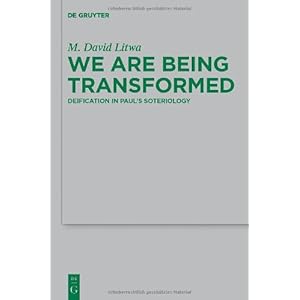
"Today, biblical scholarship on deification is more or less dominated by theological discourse and presuppositions. In this climate, it is tempting to simply focus on Christian forms of deification when treating Paul. I am convinced, however, that scholars will never understand Paul and deification until they open themselves up to honest historical inquiry about other, larger discourses of deification in the Greco-Roman world. ...If we are going to achieve a truly historical understanding of deification in the Greco-Roman world (including Christian deification), it seems to me that scholars need to be more sympathetic to ancient forms of thought. In modern theology, the very way we think about humans and God(s) tends to preclude deification. ...In this study I try--as best I can--to peer behind centuries of Christian theological discourse about deification. But the road is hard. Some of the texts are scattered and unfamiliar. My argument requires deep and sympathetic listening to Greco-Roman sources and the careful reconstruction of ancient modes of thought. ...The best reader of this study is the one who will bracket later theological distinctions (e.g., the essence/energies distinction, synergy vs. sola gratia, 'natural' vs. adoptive sonship) in an effort to look at the evidence afresh and with an open mind. Every author desires such readers, but the controversial nature of this study requires that I must ask for them" (vii-viii).
Already in the preface to his book M. David Litwa announces the difference between his approach to deification in Paul's soteriology and what he takes as the more common approach to deification in biblical scholarship. Litwa takes a comparative, history of religions approach to the question and deliberately brackets questions raised by later theological discourse in order to understand Paul's language of deification in his historical context. Methodologically, then, Litwa is a child of the Protestant Reformation and Enlightenment every bit as much as was F. C. Baur or Adolf von Harnack, and his study represents the continuing value of historical-critical study of early Christianity. As with the Religionsgeschichtliche Schule Litwa undertakes to explore deification as a soteriological category for Paul not as he was later understood and employed in the Christian doctrine of theosis, but as he might have been understood in the context of the ancient Jewish and Hellenistic world of which he was a part.